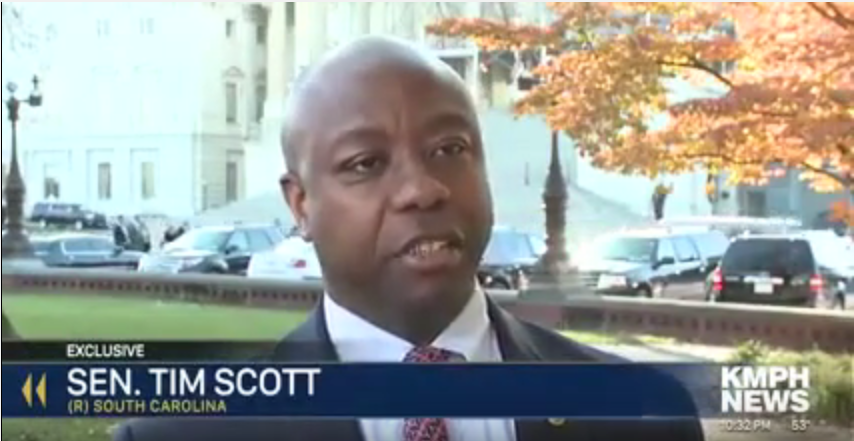|

Video
of
Senator
Scott
discussing
the
EPIC
Act HERE
WASHINGTON -
Following
the
Senate
Finance
Committee's
investigation
into
the
Internal
Revenue
Service’s
(IRS)
treatment
of
conservative
organizations,
U.S.
Senator
Tim
Scott
(R-SC)
today introduced
the End
the
Partisan
IRS
Culture
(EPIC)
Act to
end
mandatory
labor
unions
and
decrease
political
decision
making
at
the
IRS.
Senator
Scott
announced
his
new legislation following
last
week’s
hearing
with
IRS
Commissioner
John
Koskinen
on
how
the
agency
is
responding
to
and
implementing
the
Committee’s
August
2015
bipartisan
investigative report.
“The
American
people
should
be
able
to
trust
that
the
Internal
Revenue
Service
is
running
as efficiently
as
possible,
and
not
being
used
by
any
president
as
a
blunt
force
tool
to
enact
revenge
on
political
enemies,”
Scott
said.
“Unionization
has
led
to
hundreds
of
employees working
solely
on
union
issues
instead
of
serving
the
American
people,
with
95
percent
of
the
political donations
from
these
union
dues
going
to
Democrats."
Scott
continued,
“My
legislation
will
help
end
the
partisan
culture
at
the
IRS
by
exempting
the
agency
from
labor
organization
and
collective
bargaining
requirements.
We
should
put
the
200-plus
employees
currently
doing
union
work
back
to
serving
the
American
taxpayers,
not
their
union
bosses
and
the
politicians
they
support.
They
should
be
processing
refunds
and
answering
taxpayers’
phone
calls
rather
than
letting
almost
9
million
Americans
be
hung
up
on
with
a
‘courtesy
disconnect.’”
The
EPIC
Act
would
amend
the
Federal
Service
Labor-Management
Relations
Statute
to
designate
the
IRS
as
an
agency
that
is
exempt
from
labor
organization
and
collective
bargaining
requirements.
In
2011,
at
a
cost
of
$27
million
to
hard-working
taxpayers,
IRS
employees
spent
more
than
600,000
hours
of
official
time
on
union
duties;
more
than
200
IRS
employees
worked
full
time
on
union
issues.
Additionally,
almost
50,000
IRS
employees
pay
union
dues
and
more
than
95%
of
the
union’s
political
contributions
have
gone
to
Democratic
candidates
in
recent
elections. In
recent
years,
hyper-politicization
at
the
agency
led
to
conservative
organizations
being
singled
out
based
on
the
existence
of
key
words
in
their
names,
or
any
other
indication
that
they
held
conservative beliefs.
Currently,
several
agencies
are
already
excluded
from
the
statute's
Federal
Service
Labor-Management
Relations
Statute,
including
the
Government
Accountability
Office
(GAO),
the
Federal
Bureau
of
Investigation
(FBI),
the
Central
Intelligence
Agency
(CIA),
the
Federal
Labor
Relations
Authority,
the
Federal
Impasses
Panel,
and
the
U.S.
Secret
Service.
Presidents
are
able
to
exclude
additional
agencies
or
subdivision
from
coverage.
President
have
excluded
additional
agencies,
including
the
Federal
Air
Marshall
Service
and
several
subdivisions
of
each
branch
of
the
military.
Senator
Scott’s
bill
would
add
the
IRS
to
the
list.
### |